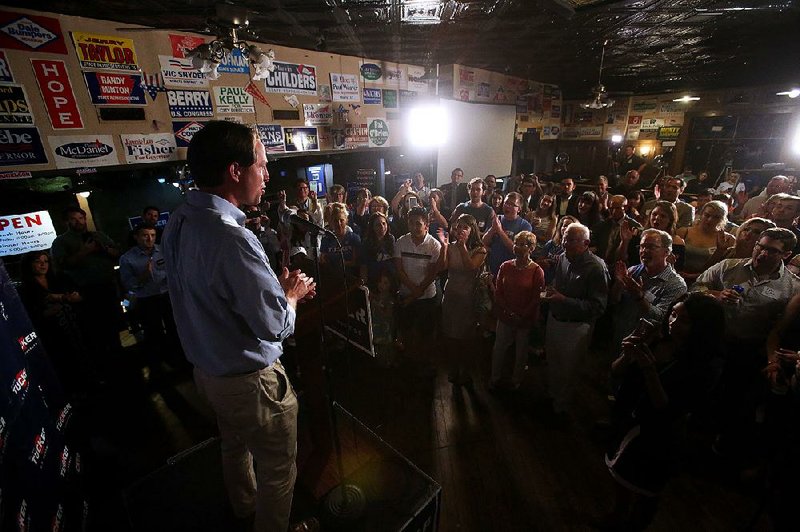As French Hill and Clarke Tucker pivot to November's general election, politicos around the country will be watching.
The question on everyone's mind: Can a Democrat still win a congressional race in Arkansas?
"Certainly, [the 2nd Congressional District] is the most realistic prospect in Arkansas," said Hal Bass, professor emeritus of political science at Ouachita Baptist University. "It's an uphill path, but there is a path to victory."
Tucker, a Little Rock attorney and two-term state representative, won Tuesday's four-way primary race for the Democratic nomination for the 2nd District. He'll square off with Hill, the two-term U.S. representative, on Nov. 6. Libertarian Joe Swafford is also running for the seat.
[ELECTIONS COVERAGE: Find all results + stories]
National interest in the race became abundantly clear minutes after the primary was called for Tucker.
The National Republican Congressional Committee -- the campaign and fundraising arm for Republicans in Congress -- tied Tucker to House Minority Leader Nancy Pelosi, D-Calif., and the "Hollywood elite."
"He is done for in the general election," said Maddie Anderson, a committee spokesman.
Its counterpart -- the Democratic Congressional Campaign Committee -- attacked Hill for his "record of standing for Washington's special interests."
"French Hill is in for the fight of his career," the group said in a statement.
Tucker won nearly 58 percent of the vote, according to unofficial returns. He defeated three more liberal candidates: Gwen Combs, a Little Rock School District teacher; Paul Spencer, a history teacher at Little Rock's Catholic High School for Boys; and Jonathan Dunkley, director of operations at the University of Arkansas Clinton School of Public Service.
Arkansas was one of four states with primary elections Tuesday; Kentucky and Georgia also held primaries and Texas had a primary runoff.
Capri Cafaro, executive in residence at American University's School of Public Affairs in Washington, D.C., said Tucker's win differed from results in other states where more liberal candidates tended to have success at the polls.
"There seems to be a trend that Democrats are voting for more progressive candidates in primaries in 2018, potentially to their peril in the general election," said Cafaro, a former Democratic member of the Ohio Senate.
Tucker carried all seven counties that make up the district -- Pulaski, Conway, Van Buren, White, Perry, Faulkner and Saline counties.
However, Joseph Giammo, a political science professor at the University of Arkansas at Little Rock, said voter turnout on Tuesday favored Republicans.
In the 2nd District, 46,437 voted in the Republican gubernatorial primary between Gov. Asa Hutchinson and Jan Morgan; 38,854 voted in the Democratic gubernatorial primary between Jared Henderson and Leticia Sanders.
That turnout picture, Giammo said, isn't good for Democrats hoping to retake Hill's seat, which has been held by the GOP since 2011.
"It suggests the kind of advantage, in terms of mobilization, that would make [Hill] much more vulnerable isn't there right now," Giammo said. "Now, a lot could change between now and November."
Bass, the professor emeritus, said Tucker must win Pulaski County overwhelmingly in November while narrowing the margins of defeat in the outlying counties.
"The question is, where are you going to get the votes in the surrounding counties?" Bass said. "The demographics and socioeconomics of the district suggests that you'd be looking at college-educated and women voters outside Pulaski County. Nationally, that's what seems to be building in the Democratic Party."
In the end, Bass, Giammo and Cafaro all agree that midterm elections usually come down to one thing -- voter turnout.
"It's all about who shows up for the Democrats, who shows up for the Republicans and who doesn't," Cafaro said.
At 7 a.m. Wednesday, Tucker was standing at the intersection of South University Avenue and Asher Avenue in Little Rock holding a homemade sign that said: "Thank you, 2nd District. Let's get to work."
His message won't change, Tucker said.
"Health care, the economy, education," he said. "Issues that really affect our communities. Those are the issues that I worked on in the state Legislature and issues I want to work on in Congress."
Hill, a former banker, said he plans to focus on his "record of lower taxes and a stronger economy." Tucker, he said, has a record of supporting higher taxes and bigger government.
Hill won re-election in 2016, taking more than 58 percent of the vote against Democrat Dianne Curry. Curry, a former Little Rock School Board member, lacked the national party support Tucker has, and she only raised about $35,000 the entire race. Tucker, since announcing his candidacy in February, has reported more than $600,000 in campaign contributions.
As for Combs, Dunkley and Spencer, the future isn't clear. Combs in a Wednesday phone interview didn't rule out another run for public office, but she said running a campaign while teaching full time was extremely constraining.
Any future run for office would have to be the "right opportunity with the right level of support."
Combs, who took just one day off work for the election, said she was proud of her "people-powered campaign."
"I'm committed to working to affect change," said Combs, who organized the Arkansas Women's March after the 2016 presidential election.
"I've come at this whole campaign from a position of passion about making change and that doesn't end with this election, but I don't know exactly what shape that takes yet."
Dunkley said he plans to take some time off to evaluate his next steps.
Spencer in an interview late Tuesday night said he is proud to support Tucker in November. He plans to keep working on campaign finance reform, but, while he won't totally rule it out, Spencer doesn't see himself running for public office again.
RELATED ARTICLES
http://www.arkansas…">Court race forecast: Mud, moneyhttp://www.arkansas…">Mechanical problems delay Lonoke County vote results
Metro on 05/24/2018

